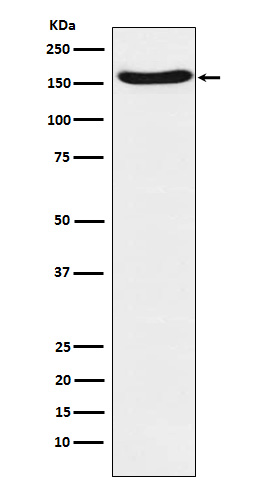
| WB | 咨询技术 | Human,Mouse,Rat |
| IF | 1/20-1/50 | Human,Mouse,Rat |
| IHC | 咨询技术 | Human,Mouse,Rat |
| ICC | 技术咨询 | Human,Mouse,Rat |
| FCM | 咨询技术 | Human,Mouse,Rat |
| Elisa | 咨询技术 | Human,Mouse,Rat |
| Aliases | FA 1; FA; FA H; FA1; FAA; FACA; FAH; Fanca; FANCH;;FANCA |
| WB Predicted band size | Calculated MW: 163 kDa ; Observed MW: 163Da kDa |
| Host/Isotype | Rabbit IgG |
| Antibody Type | Primary antibody |
| Storage | Store at 4°C short term. Aliquot and store at -20°C long term. Avoid freeze/thaw cycles. |
| Species Reactivity | Human |
| Immunogen | A synthesized peptide derived from human FANCA |
| Formulation | Purified antibody in PBS with 0.05% sodium azide,0.05% BSA and 50% glycerol. |
+ +
以下是关于FANCA抗体的3篇参考文献的简要信息:
1. **文献名称**:*"FANCA protein is required for the DNA repair function of the Fanconi anemia pathway"*
**作者**:J. P. de Winter et al.
**摘要**:研究通过Western blot和免疫沉淀技术,利用FANCA抗体验证了FANCA蛋白在范可尼贫血(FA)患者细胞中的缺失,并证明其参与DNA损伤修复通路的调控。
2. **文献名称**:*"Functional interaction of the Fanconi anemia proteins FANCA and FANCC in DNA repair"*
**作者**:M. D. Garcia-Higuera et al.
**摘要**:通过免疫共沉淀和免疫荧光实验(使用FANCA抗体),揭示了FANCA与FANCC蛋白的相互作用,并阐明了二者在维持基因组稳定性中的协同作用。
3. **文献名称**:*"The Fanconi anemia pathway promotes DNA glycosylase-dependent BER"*
**作者**:S. S. Mukherjee et al.
**摘要**:该研究利用FANCA抗体进行蛋白质印迹分析,发现FA通路通过调控碱基切除修复(BER)中的糖基化酶活性,影响氧化性DNA损伤的修复效率。
这些文献均通过FANCA抗体验证蛋白表达或互作,支持其在DNA修复机制中的关键作用。
The FANCA antibody is a crucial tool in studying Fanconi anemia (FA), a rare genetic disorder characterized by bone marrow failure, congenital abnormalities, and heightened cancer susceptibility. FANCA, a gene encoding a protein central to the FA pathway, plays a pivotal role in DNA repair, particularly in resolving interstrand crosslinks. Mutations in FANCA account for approximately 60-70% of FA cases, making it the most frequently mutated gene in this pathway. The FANCA protein forms part of the FA core complex, which monoubiquitinates FANCD2/FANCI to activate downstream DNA repair mechanisms.
FANCA antibodies are widely used in research to detect and quantify FANCA protein expression via techniques like Western blotting, immunofluorescence, and immunohistochemistry. These antibodies help elucidate FANCA's subcellular localization, interactions with other FA proteins, and dysregulation in FA patients or cancer models. Specificity and validation are critical, as they ensure accurate detection of FANCA variants or truncations linked to disease. Clinically, FANCA antibodies may aid in diagnosing FA by identifying protein deficiencies in patient-derived cells.
Beyond FA research, FANCA antibodies contribute to understanding cancer biology, as FA pathway defects impair genomic stability, predisposing individuals to malignancies like leukemia. They also support therapeutic development, such as monitoring FANCA restoration in gene therapy trials. Available in polyclonal or monoclonal forms from various host species, these antibodies remain indispensable for unraveling FA pathophysiology and its broader implications in DNA damage response.
×